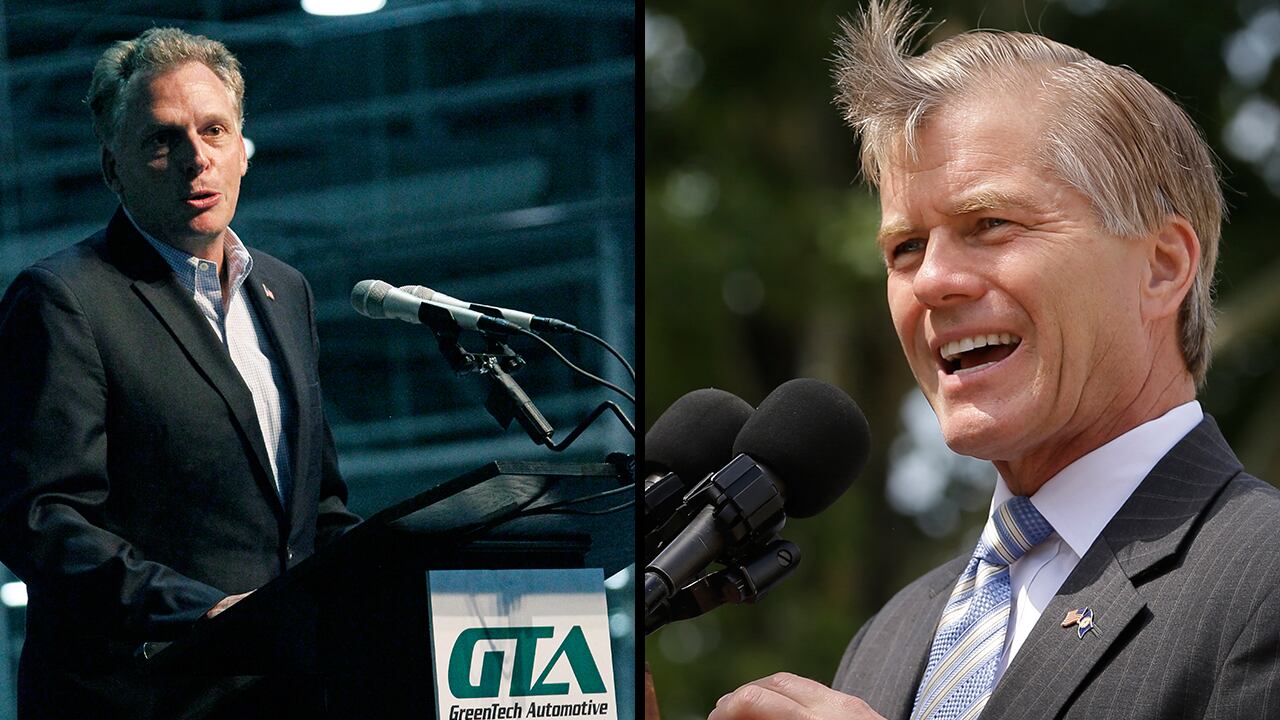When Virginia’s Republican lieutenant governor, Bill Bolling, announced earlier this year that he wouldn’t be running as an independent in the gubernatorial race, he expressed his hope for an honorable and informative campaign season. “I encourage them to run campaigns that are worthy of Virginia,” he said, referring to Democratic nominee Terry McAuliffe and GOP nominee Attorney General Ken Cuccinelli, “campaigns that focus on the big issues facing our state and offer a positive vision for the future of Virginia.”
Bolling must be disappointed.

To start, there’s the ongoing investigation into Gov. Bob McDonnell over loans and gifts from Jonnie Williams, CEO of Star Scientific, a Virginia-based nutrition company. Under the state’s campaign-finance laws, lawmakers can accept gifts, as long as they report amounts above $50 to the state. But McDonnell and his family received more than $140,000 in gifts and financial assistance without reporting it to state authorities. And while there’s no direct evidence of quid pro quo, members of the McDonnell family have used state resources effectively to advertise for Star Scientific. To wit, in 2011, the McDonnells held what amounted to a sales pitch for the company just a few weeks after Williams purchased a $6,500 Rolex watch for the governor. That’s one hell of a coincidence.
So far, the governor has escaped legal trouble, but that could change. Williams has turned over financial records and given interviews to federal investigators, which could be a precursor to a criminal case against the governor. What’s more, there’s a chance this investigation could lead to new disclosures about Ken Cuccinelli’s relationship to Williams and Star Scientific. Not only has the attorney general received nearly $19,000 in gifts from Williams since 2009, but as attorney general, Cuccinelli received free lodging, transportation, and food from Star Scientific, and was forced to recuse himself from a dispute over a $1.7 million tax bill for the company. (He was cleared of any wrongdoing several weeks ago after a three-month investigation.)
The cloud of scandal isn’t limited to Republicans. McAuliffe’s former clean-energy company, GreenTech, is under investigation by the Securities and Exchange Commission over its conduct in soliciting foreign investors. As The Washington Post reports, GreenTech “sought overseas investors through a federal program that allows foreigners to gain special visas if they contribute at least $500,000 to create U.S. jobs.” GreenTech allegedly “guaranteed returns” to its investors. Now the SEC is keeping a closer eye on companies that use the visa program to make sure investors haven’t been “misled or defrauded” by those seeking their cash.
The McAuliffe campaign says the candidate “has no knowledge of the investigation,” but the news adds to the ethical cloud surrounding the former Democratic fundraiser. Already McAuliffe has been forced to contend with constant questions over his decision to locate a vehicle production facility in Mississippi rather than Virginia.
In other words, today the space is even wider for a third-party bid from Bolling, who can present himself as a more respectable alternative to Cuccinelli or McAuliffe while still distancing himself from McDonnell. But the lieutenant governor continues to face significant if not insurmountable obstacles. Virginia gubernatorial elections are expensive: the Republican and Democratic candidates spent nearly $30 million in 2001, $40 million in 2005, and $45 million in 2009.
To compete, Bolling would have to raise millions of dollars on short notice. That’s not impossible—Virginia’s laws allow candidates to raise unlimited amounts from just a handful of individuals—but it’s unlikely. There simply aren’t enough people with deep pockets who are dissatisfied with the current choices and looking for an alternative. And without a sizable war chest, Bolling can’t overcome the logistical disadvantages that come with running outside an established party organization, though Maine Sen. Angus King and Rhode Island Gov. Lincoln Chafee have both mounted successful independent statewide campaigns in recent years.
Bolling also would have to distinguish himself politically from Cuccinelli, which is tougher than it looks. While the lieutenant governor isn’t as ideological as the attorney general, he has never disavowed the Republican Party and falls squarely on the right side of its spectrum, with support for abortion restrictions, voter-identification laws, and highly pro-business policies.
What Virginia has, then, is an unpopular governor who has seen his approval rating plummet to 36 percent since the scandal broke and two gubernatorial candidates struggling to build trust and support with the state’s voters. Quinnipiac University’s most recent survey of the race found McAuliffe with a 4-point lead over Cuccinelli, 43 percent to 39 percent, the same lead the Democrat has held for most of the year. But few voters describe either candidate in positive terms: McAuliffe has a favorability rating of 30 to 19; Cuccinelli, 31 to 30.
Virginia is dissatisfied with its political choices, but there doesn’t seem to be anyone who can capitalize on it. Come November 5, voters will have to choose the lesser of two evils, and I doubt anyone will be happy with the outcome.





